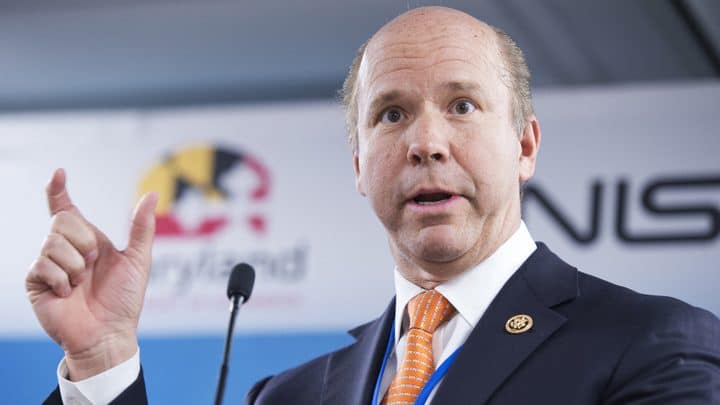Social Security
Democratic Congressman John Delaney Wants To Cut Your Social Security And Thinks He Can Become President
The composition of the Delaney commission would include a majority of members appointed by Republicans who want to cut and even dismantle Social Security.

[dropcap]C[/dropcap]ongressman John Delaney (D-MD) has announced that he will not run to retain his seat in 2018 but will instead run for president. If he wants to have even a prayer of winning, he would be well advised to get right on Social Security.
Shortly after last year’s election, Delaney announced that he wanted to tie a proposal establishing a Social Security commission, whose recommendations would be fast-tracked through Congress, to must-pass debt ceiling legislation. Like clockwork, now that the debt ceiling is looming, he recently introduced, together with Representatives Scott H. Peters (D-CA), Tom Cole (R-OK), and David A. Trott (R-MI), the fast-track commission legislation he threatened.
Make no mistake: If Delaney’s commission ever were established, there is no question that it would recommend cuts. The composition of the Delaney commission would include a majority of members appointed by Republicans who want to cut and even dismantle Social Security.
Given the procedures Delaney specifies in his proposal, it would be very hard to stop the commission’s recommendations to cut Social Security from becoming law. The result would be a process much like what the nation witnessed with Trumpcare, but even worse.
As with Trumpcare, there would be no Congressional hearings, only extremely limited floor debate. Opponents of the commission’s proposals would have no ability to filibuster or otherwise slow the legislation down. On top of that, no amendments at all would be in order, so the vote would be up or down by bare majorities in both chambers of Congress.
The procedure is designed to force quick action while shielding those who vote for it from political accountability. When those voting for it go home to face their constituents, they will predictably claim they didn’t like the unpopular provisions but could not modify the package.
The Delaney commission would be an outrage. It is bizarre for someone planning to run for president to be pushing it. Even from a purely self-interested point of view, he is making a huge mistake.
Delaney is a Wall Street millionaire who is planning to self-fund his presidential campaign and has likely never had to worry about his own retirement. So perhaps he needs to be educated on how important Social Security is to Americans outside of his rarified social circles.
[dropcap]S[/dropcap]ocial Security provides two-thirds of retirees with half or more of their income. It provides virtually all of the income of one-third of senior beneficiaries. Cutting these modest benefits would throw millions into poverty and increase the depths of poverty of millions more.
The American people are divided on many issues, but not Social Security. They recognize that Social Security is a solution and should be expanded, not cut. Poll after poll showsthat Democrats, Republicans, and Independents overwhelmingly agree that Social Security should not be cut and that the program’s modest, but vital, benefits are more important than ever.
Recognizing the wisdom of the American people, the 2016 Democratic Party Platform, called for expanding, not cutting, Social Security. It’s not just the platform. An overwhelming majority of Democrats in both the House and Senate support expanding Social Security, too. But apparently, Delaney missed the memo.
Delaney and the advocacy groups funded by anti-Social Security billionaire Pete Peterson like to claim that by supporting a commission, they are not advocating cuts but simply the same process used when the so-called Greenspan Commission developed recommendations that became the Social Security Amendments of 1983. Nothing could be further from the truth.
Let me set the record straight. I was Alan Greenspan’s top assistant in his position as chair of that commission. The proposed Delaney commission is nothing like the Greenspan Commission. Indeed, it is the polar opposite.
The Greenspan Commission, like many advisory councils before it, simply made recommendations. Those recommendations could have been ignored. Once they were turned into legislative language and introduced, the proposals went through the so-called regular order, with hearings and open mark-ups. Both the House and the Senate had the ability to amend and debate the legislation.
Shortly before his death, Robert M. Ball, the longest serving commissioner of Social Security and a key member of the Greenspan Commission, wrote “The Greenspan Commission: What Really Happened” (The Century Foundation Press, 2010). He was so concerned that the Greenspan Commission would be improperly used today to justify and argue for a commission like Delaney’s that he asked that his account be published posthumously. He urged today’s legislators to not hide behind a commission but instead to vote to restore Social Security to long-range balance with no cuts whatsoever.
In words that Delaney should take to heart, Ball explained:
“[T]o suggest that the Greenspan Commission provides a model for resolving questions about Social Security’s future would be laughable if it weren’t so dangerous. Democrats in Congress who believe in strengthening rather than undermining Social Security should be willing to stand up for what they believe – preferably with a strong supporter of Social Security in the White House – but stand up in any case. A commission is no substitute for principled commitment.”
A number of bills that restore Social Security to long-range actuarial balance, while also expanding and improving benefits, have been introduced in this Congress alone. If Delaney truly has Social Security’s best interest (or even his own political future) at heart, it’s not too late for him to abandon his commission proposal. Instead, he should join 164 of his fellow Democratic House members in co-sponsoring the Social Security 2100 Act, which expands benefits and ensures that they will be paid in full and on time through the end of the century.
In contrast to that responsible legislation, Delaney’s scheme would be unprecedented in the history of Social Security. Historically, major Social Security legislation has been subject to so-called regular order. Never have changes been fast-tracked as Delaney is advocating. And, outrageously, he wants to ram his commission through Congress as part of the must-pass debt limit legislation.
If Delaney continues to push his scheme to cut our Social Security behind closed doors, it is good that he will be leaving the House for a presidential campaign doomed to failure. No doubt a Democrat who listens to the American people by fighting to protect and expand Social Security will be happy to take his seat.







